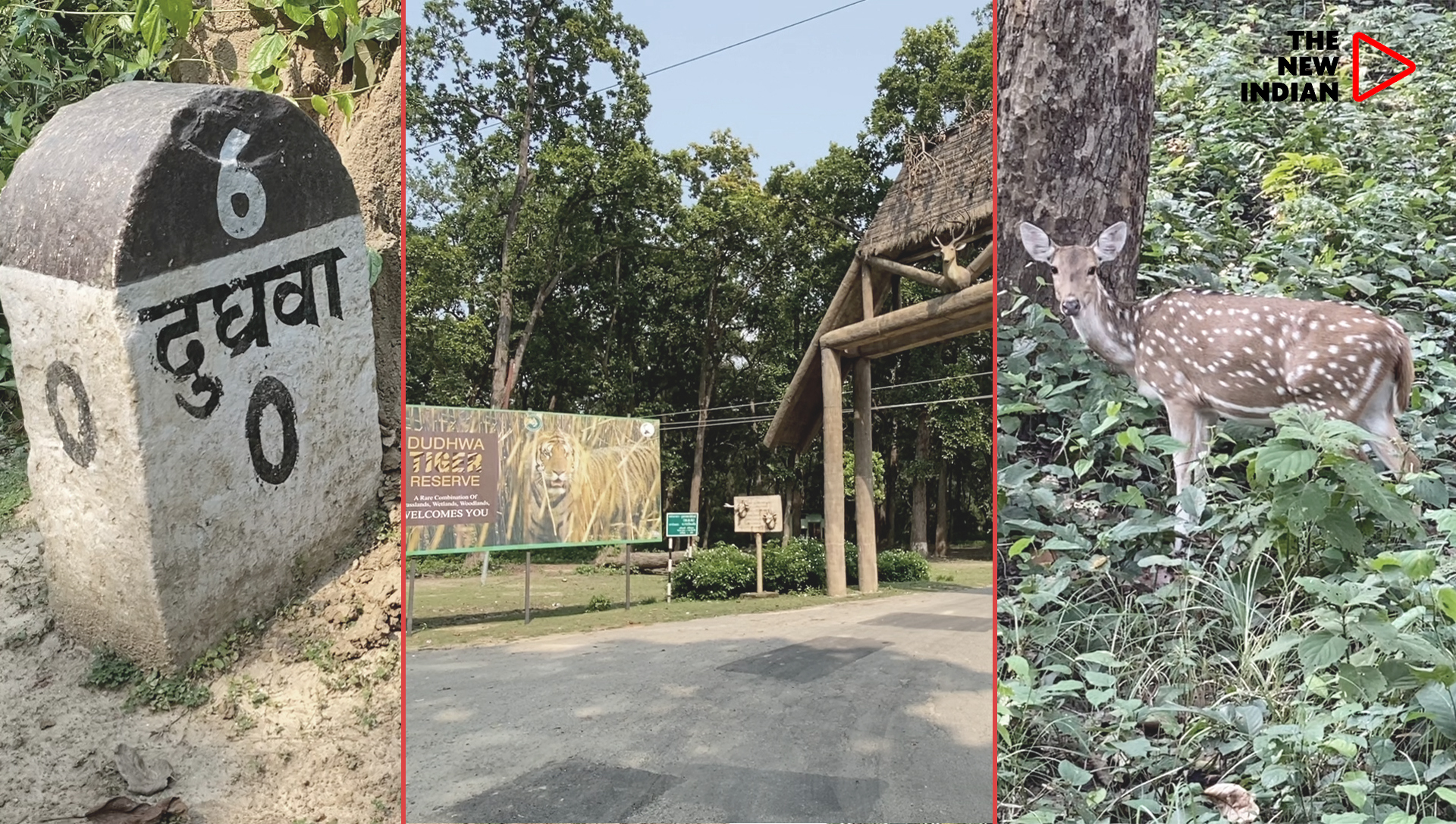DUDHWA TIGER RESERVE (LAKHIMPUR KHERI): After more than a week of reporting on both factions who clashed in Lakhimpur Kheri in Uttar Pradesh, the team of The New Indian reporters reaches the border of India -Nepal.
As we decide to meet locals and nature enthusiasts, the lush green forests at Dudhwa Tiger Reserve, 60 km from the site of clashes, welcome us with unmistakable warmth into the nature’s lap.
The lush green forests of Dudhwa Tiger Reserve, 60 km from the site of clashes, welcome us into the lap of nature with openness and warmth. As we spend hours in search of the elusive tiger, we find the love and affection between all communities— Sikhs and Hindus — just the same as it was earlier.
They are all waiting for tourism to prosper here, more so when the park opens in November so the shutterbugs can capture the tiger sightings, record their roars and follow their movements.
While showing us the pug marks of a tigress, two forest rangers Mohan Lal and R B Verma speak animatedly on welcoming tourists – whether rich Sikh farmers or backpackers from Delhi or Chandigarh.
“Look at these marks, they belong to a tigress. This one gave birth to two cubs recently. She has been on frequent hunts for food for her cubs and has been regularly sighted with her kill. It’s for such sightings that people come here,” says Mohan Lal, forest ranger, Kishanpur, Dudhwa Tiger Reserve. TNI EXCLUSIVE: Hari Om Didn’t Marry, Wanted To Serve His Father Fight Cerebral Palsy: Driver’s Mother On Lakhimpur Kheri Violence
The forest dwellers distance themselves from any groupism and see themselves as one community.
We don’t have anything to do with caste and religion. We are nature enthusiasts. We have to look after the tourists. Whoever comes here is our guest. A lot of visitors are Sikhs and they all follow all the protocols of the park. That’s what a good society behaves like
The park is usually thrown open to the public from November. On average, 3,000-4000 people visit the forest daily.
“We are hopeful that more tourists will visit the park this year. Lakhimpur Kheri clashes may just be a one-off incident, but people from every society co-exist here with a healthy bond and affection. I have a lot of friends from the Sikh community. Some of them are farmers and others are transporters,” says Verma.
The 44-year-old farmer and a tour operator from Chokra Farms, who lost Lovepreet Singh in October 3 clashes, doesn’t want to recall the incident.
“There is bonhomie and there’s love. For tourism, for festivals and for daily chores. These relationships are for ages,” says Balwinder.
In fact, just two years ago in 2019, more than a dozen men from the prominent Rai Sikh community were given jobs as forest watchers to look after the wildlife in Sampurna Nagar part of Dudhwa Tiger Reserve. TNI’s Report From Lakhimpur Kheri – My Son Became Reporter 5 Months Ago; Wish Cops Took Him To Hospital, Not Mortuary, Says Father
“As far as the clashes are concerned, thaali hamesha dono haath se bajti hai. Both groups must be at fault. I only wish that just like we are guarding this place, people should protect each other from all wrongdoings including hatred, violence and malice. Just like I love watering plants, installing cameras at key points, checking attempts to poach or smuggle and illegally photograph wildlife here, one must fall in love with nature,” says Sona Singh, a forester from Rai Sikh community.
“If we are in such a beautiful space, let’s all love and peacefully express ourselves. Why fight, let the law handle the situation. Those who have taken the law into their hands will always face the music. So let’s preserve nature and thank God for the jobs we have in building this biodiversity,” says Shamsher Singh.
The terai ecosystem is a highly productive habitat of diverse flora and fauna. It is home to a large number of restricted species.
More than 450 species of 1,300 birds listed in the subcontinent, are found in this reserve. These include hornbill, peafowl, Bengal florican, fishing eagle, serpent eagle, osprey and woodpeckers.
As these men guard forests against poachers and put up cameras to ensure the safety of swamp deer, elephant, Sambar, hog deer, cheetal, wild pig or the trees, sag-wan, Sal, they all want to make Dudhwa better than neighbouring Corbett and Bandhavgarh.
“I have spent a year and a half here in the forest. Though we are on contract, my only request to the government is that our salary must reach on time. We only get paid in lumpsum and over a long stretch. I am proud of donning this uniform and guard the forests. I hope peace prevails in Kheri and we bring in prosperity, says Gurmail Singh.
As we wind up our forest trail, Mohan Lal comes back to bid The New Indian goodbye with a Ram Charit Manas couplet:
Kujahi khag mrag nana branda, abhay charahi ban karwhi ananda
“Loosely translated, it means: the wild animals move here freely. Nature has given them birth so they roam freely. Let’s also be a part of the system than fight over land and meals,” says Lal.









